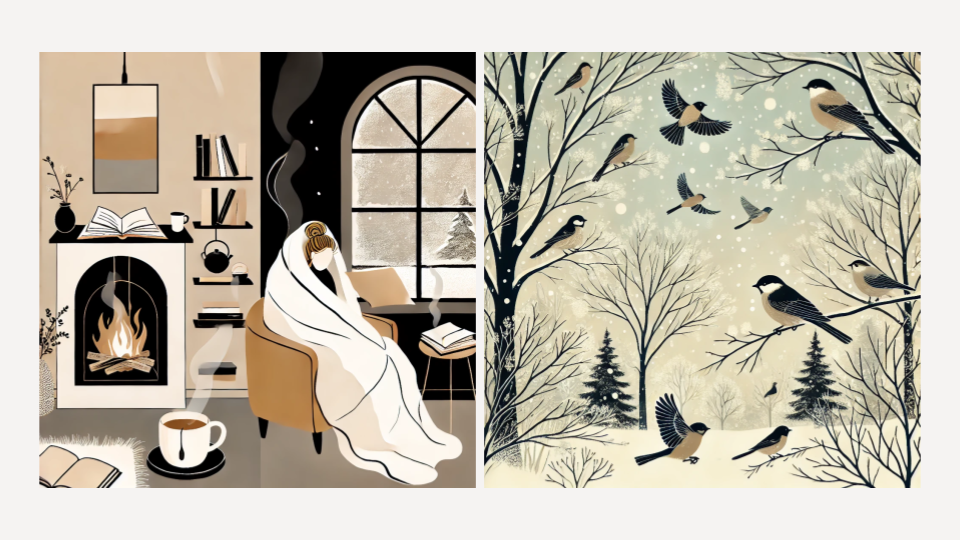As the end of the year settles in, you might notice a distinct downshift in energy, both in yourself and the world around you. Messages flood in about “finishing strong”, yet everything feels like it’s naturally winding down.
It’s not just your imagination: large-scale industry surveys suggest that by mid-December, over half of workers report a significant decline in productivity, and that more than 20% of employees completely lose focus around that time of the year.
But rather than fighting this seasonal ebb, you can embrace it as a necessary part of our human rhythm — and even learn the art of “wintering” during other challenging times, regardless of the season.

From Birds to Humans
Wintering was initially a term used in biology to describe how certain animals and birds survive cold seasons. While some species migrate to warmer climates, others stay in place and adapt their behaviors and physiology to survive harsh conditions. Wintering can involve reducing activity, conserving energy, and drawing on stored resources.
This biological concept was translated to our human experience by Katherine May in her 2020 book Wintering, where she showed how humans, just like wintering animals, need periods of retreat to survive life’s difficult seasons. In essence, just as nature moves through cycles of activity and rest, humans too need periods of pulling back and recharging.
Research in chronobiology supports this idea that our bodies respond to seasonal changes with shifts in hormones, sleep patterns, and energy levels. Fighting these natural rhythms can lead to increased stress, decreased immunity, and emotional exhaustion.
You might be wondering about the usefulness of this concept if you live in the southern hemisphere or a warmer climate. Although darkness and cold naturally invite it, for us humans wintering isn’t strictly about the calendar season.
It’s about actively accepting and working with our own dark seasons, whether triggered by burnout, loss, or illness. It’s a useful metaphor when we need to process challenging experiences and restore a sense of balance in our lives, with self-kindness and without rushing.
Definition of wintering: The act of withdrawing from the world to focus on one’s inner world; active acceptance of dark and cold times; a form of calm resilience.
Psychologists have found that these periods of retreat, when approached mindfully, can lead to significant personal growth and enhanced resilience, and research in neuroscience shows that periods of relative quiet and withdrawal are crucial for brain health.
During these times, our brains engage in vital maintenance processes, consolidating memories, processing emotions, and rebuilding neural pathways. This mirrors what happens in nature during winter months. It’s not a time of death, but of vital restoration.
How to Practice the Art of Wintering
Wintering is not about completely withdrawing or giving up. It’s about finding the right balance between rest and movement, solitude and connection. Like a tree pulling energy into its roots, it’s about gathering strength for your next season of growth.
• Build a winter nest. Choose a quiet corner of your home to optimize for coziness and to transform into a sanctuary. Designate it as a screen-free zone. Add soft lighting and comfortable seating. Stock up on herbal teas, healthy snacks, and journaling supplies.
• Adjust your rhythm. Review your calendar and cut back on non-essential obligations during your wintering period. Be mindful of your energy levels and schedule demanding tasks during your peak hours. Leave buffer space between activities instead of scheduling back-to-back commitments. Allow yourself to sleep an extra hour if your body asks for it.
• Nurture inner growth. Start a creative project purely for enjoyment, without pressure to achieve or produce. Set aside 15 minutes daily for reflective writing. Such a simple metacognitive practice can help process emotions and track patterns in your inner life. Choose books that invite contemplation and slow reading.
• Deepen your relationships. In social situations, focus on quality over quantity. Really listen and engage rather than multitasking. Cook nice meals for loved ones. Consider hosting intimate gatherings, for example by inviting 2-3 friends for tea or dinner.
As you move through December and beyond, consider how you might intentionally embrace wintering. What would it feel like to release the pressure to maintain peak productivity year-round? How might you create space for restoration amidst life’s inherent messiness?
The answers will be different for everyone, but the invitation remains the same: instead of enduring moments of darkness, we can welcome and honor them, so they lead to deep transformation and self-renewal.
